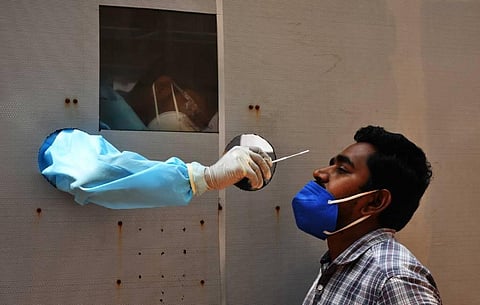

Answering a question in the Rajya Sabha on September 17, Union Minister of Tribal Affairs Arjun Munda stated that the Covid-19 positivity rate across the 177 districts where tribal communities comprise over 25% of the population was under 3%. There was “no report of major outbreak of the disease in tribal areas”, the minister added.
Considering that there are around 60.7 lakh total Covid-19 cases in the country (as of September 28) as against a population of 138 crore, the study seems to suggest that Covid-19 positivity is as much as eight times the nationwide average of 0.44%. For the minister to say that “there is no major outbreak” suggests a wilful blindness to the implications of the data cited. The government’s claim is also callous to the reality that most tribal areas lack testing facilities and that healthcare infrastructure in tribal areas continues to be grossly inadequate.
Several studies have highlighted the distress in rural and tribal areas, with lockdown measures, rather than the Covid-19 disease, making it difficult to access social security benefits like rations and pensions. Instead of ensuring nutritional security universally for rural and Adivasi communities, governments continue to push linking Aadhaar numbers to various schemes in order to access basic rights. Even when they have enrolled for an Aadhaar number and linked it to their ration cards, for instance, the official PDS records don’t reflect this.
In another response in Parliament, Minister of Labour and Employment Santosh Kumar Gangwar dismissed the question of providing compensations for migrant workers who lost their lives during the pandemic, saying that “the question did not arise” as “no such data was maintained”. However, notwithstanding the government’s claims, several websites carry meticulously updated data regarding migrant workers, including reasons for their deaths such as being hit or crushed by trucks or buses or trains, asphyxiation after falling in a deep pit, among others. The Health Ministry too took the “no data is available” line when asked about frontline healthcare workers, including ASHAs, who lost their lives either while on duty or in accidents.
The question is whether the government is choosing to deny the data in a desperate attempt to paper over its multiple recent failures, in particular the inability to control the spread of the pandemic. The Member of Parliament Mahua Moitra recently asked, in connection with the PM-CARES Fund, “Emperor, where are your clothes?” The answer for this again is that no data is available.
Reduction of citizens to data points: On 27 September 2010, the first Aadhaar number was issued to Ranjana Sonawane of Tembhli village in Maharashtra. “Ranjana Sonawane is now a 12-digit no.”, ran an unconsciously prophetic headline in a newspaper. Almost precisely eight years later, on 26 September 2018, the Supreme Court upheld the constitutionality of the Aadhaar project while imposing restrictions on Aadhaar use. An interview published the following day quoted Sonawane as still hoping for better access to government schemes.
During the Aadhaar hearings in the SC, the petitioners’ lawyer posited that a future Bench may comprise “Aadhaar-ed judges whose entire profile from cradle to bench is available to the government”, thanks to surveillance enabled by linking Aadhaar to various databases. One of the judges apparently took umbrage at this, something a citizen can hardly do if the government demands her data even as her fundamental rights are threatened. Despite the government’s insistence on data collection, it does not focus on addressing the concerns of those disproportionately affected by the pandemic, such as Dalits, Adivasis, women, and sexual and religious minorities.
A darker interpretation of such obfuscation over data has been voiced by many critics of the Aadhaar project over the years, and suggests that data collection for stated public purposes, like ensuring accurate targeting of welfare benefits, is only a façade masking the true intent of “databasing” citizens. This lends new perspective to the government’s heartlessness: Every time the government says it lacks data, it creates an excuse for collecting more citizen data.
Thus, the government announces plans to database unorganised sector workers, including migrant workers, using their Aadhaar numbers while denying having information about their plight. An ongoing pandemic, which has been grossly mishandled, offers the perfect backdrop for announcing a National Health ID, on Independence Day no less. Even as governance dissolves into omnishambles, The Aadhaar Authentication for Good Governance (Social Welfare, Innovation, Knowledge) Rules, 2020 are promulgated. As if signalling the government’s intent, these Rules prioritise “good governance”—whatever that means—and “preventing leakage of public funds” over “promoting ease of living of residents and enabling better access to services”.
The reminder urgently required today is that citizens have the right not to be treated as data points tracked via apps and dashboards as well as the right to demand information, accountability, and transparency from the government. For the government to demand that citizens should part with their data first before expecting “good governance” is, in effect, reversing the accountability equation. The government cannot hide behind lack of data, nor can it hide from data highlighting its failures. More citizens need to echo Moitra and ask for the government’s data, if not the Emperor’s clothes.
Sushmita
Independent researcher and journalist working on forest rights
Godavar
Writer and activist curious about use of technology in welfare governance
(Sushmita is currently participating in a study on the impact of Covid-19 on Adivasi communities. She can be reached at sushmita.verma@hotmail.com or @sushmitav1 on Twitter. Godavar, formally Raghuram S Godavarthi, can be contacted at godavar@gmail.com)